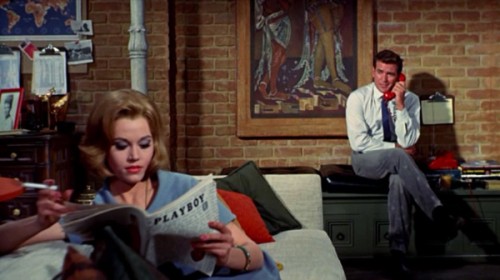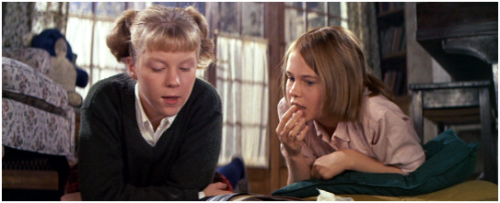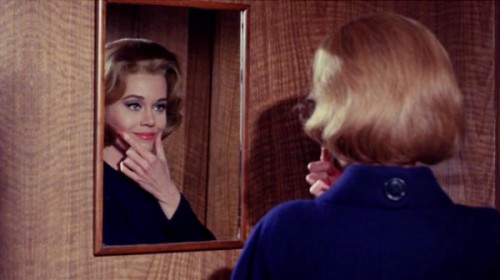TCM Fest 2014: The 1960s
Due to the nature of the festival, the relative rarity of the films screening, and my own personal predilections, I tend to stay away from anything at TCM Fest made after 1960, and don’t recall seeing anything in my four years of attending made after 1970. It’s less an issue of the ever-expanding definition of what constitutes a “classic” (the twenty-five-year rule seems fair to me), and more to do with the fact that the older films are just flat-out more difficult to see in any other capacity and are more likely to be shown on 35mm. But the schedule’s always going to throw some curveballs, and I found myself at two ‘60s films this year.
The World of Henry Orient (dir. George Roy Hill) and Sunday in New York (dir. Peter Tewksbury) both came out in 1963, both feature female protagonists, and both show the way New York, despite being a spectacularly large city, can actually feel quite small some of the time. Hill’s feature proved one of the more remarkable of the festival, one I wasn’t familiar with at all but was so deeply glad I ended up seeing. Val (Tippy Walker) and Gil (Merrie Spaeth) are two girls in their early teenage years, misfits at their private school who, as all misfits must, find solace in one another’s company. When Val develops a crush on semi-famed concert pianist Henry Orient (Peter Sellers), the two begin to follow him about town, inadvertently colliding with him during his efforts to seduce a married woman (Paula Prentiss), a coincidence he takes to be a horrible conspiracy to suppress his sexuality.
The film was Sellers’s first in America, and, despite not having a starring role, he expertly fleshes out the titular character, nodding to Henry’s roots in the Bronx, which he attempts to cover up through a mixture of vaguely European accents that cause the women around him to swoon and the men to roll their eyes. But this really is a platform for Walker and Spaeth, who beautifully establish a believable, honest friendship, the kind you can only form in those youngers years, when you can be strangers one day and inseparable the next.
Nora and her father Nunnally Johnson adapted the screenplay from Nora’s semi-autobiographical novel, marvelously exploring the limitations a family places on children, even when they’re being encouraged to develop into their own people. Val’s parents live overseas for her father’s work, and, when they come home for the holidays, it doesn’t just change her availability, it changes her very essence, as though she suddenly remembered who she was, or at least who she’s supposed to be. As she and Gil explore the city, on the prowl for Henry Orient, they discover quite a bit about their families and each other, not all of it welcome, gradually diminishing the fantastical world they’d imagined of romance, art, and the city intersecting in unfathomable ways. Romance becomes a little more unseemly, art a little less inspired, and the once-expansive and limitless city all too small.
Sunday in New York is similarly charged, insofar as it’s about a woman chasing an idea of romance that ends up slightly more base than expected. Eileen (Jane Fonda) rolls into New York to visit her airline pilot brother, Adam (Cliff Robertson), unknowingly crashing his plans for an afternoon of sweet sweet loving with his sometimes-girlfriend Mona (Jo Morrow). She laments the limits her virginity has placed on her dating life (once men find out, they flee fast), while he attempts to assure her that there’s more to love than sex, a sentiment she’s happy to take to heart until she discovers that he and Mona aren’t really off in a rush to go ice skating. Along for the ride are a bus rider with quick hands and dirty jokes (Rod Taylor) and Eileen’s blowhard boyfriend (Robert Culp), a man with a winning personality and a terrible sense of timing.
The film couldn’t possibly be more of-its-moment. A decade earlier, and it’d be astounding risque; fast-forward ten years and it’d be hopelessly old-fashioned. But coming at the time it did, at the intersection of sex-as-desirable-degradation and sex-as-pleasure, it’s downright modern, a potent blend of screwball comedy and moral rumination, with a collection of very fine, engaged performers. I’m not entirely wild about its eventual resolution, nor the rather belabored plot machinations it takes to get there, but the early sections especially are so rich with great scenes that it’s hard to feel too sore towards the whole thing.
TCM host (and veritable God amongst the network’s devoted fanbase) Robert Osborne introduced the film, oddly saying that he didn’t even know why it had been selected, but, in the true spirit of the festival, a woman jumped up and told him that she and a friend had been badgering the festival for years into showing it. The enthusiasm of TCM attendees is apparently infectious not just in ethereal, but in very concrete ways as well. Osborne then recanted interviews he had conducted with Fonda in the past, noting that her political history has gotten her into some hot water, but that she was the rare guest to personally stop and say hello to the entire crew during the interview shoot. Further, he remarked to her that he didn’t plan on discussing her politics, favoring the movies instead, to which she replied, “Thank God! I love the movies!”
And if there’s one sentiment guaranteed to draw applause at TCM Fest, it is that.






























